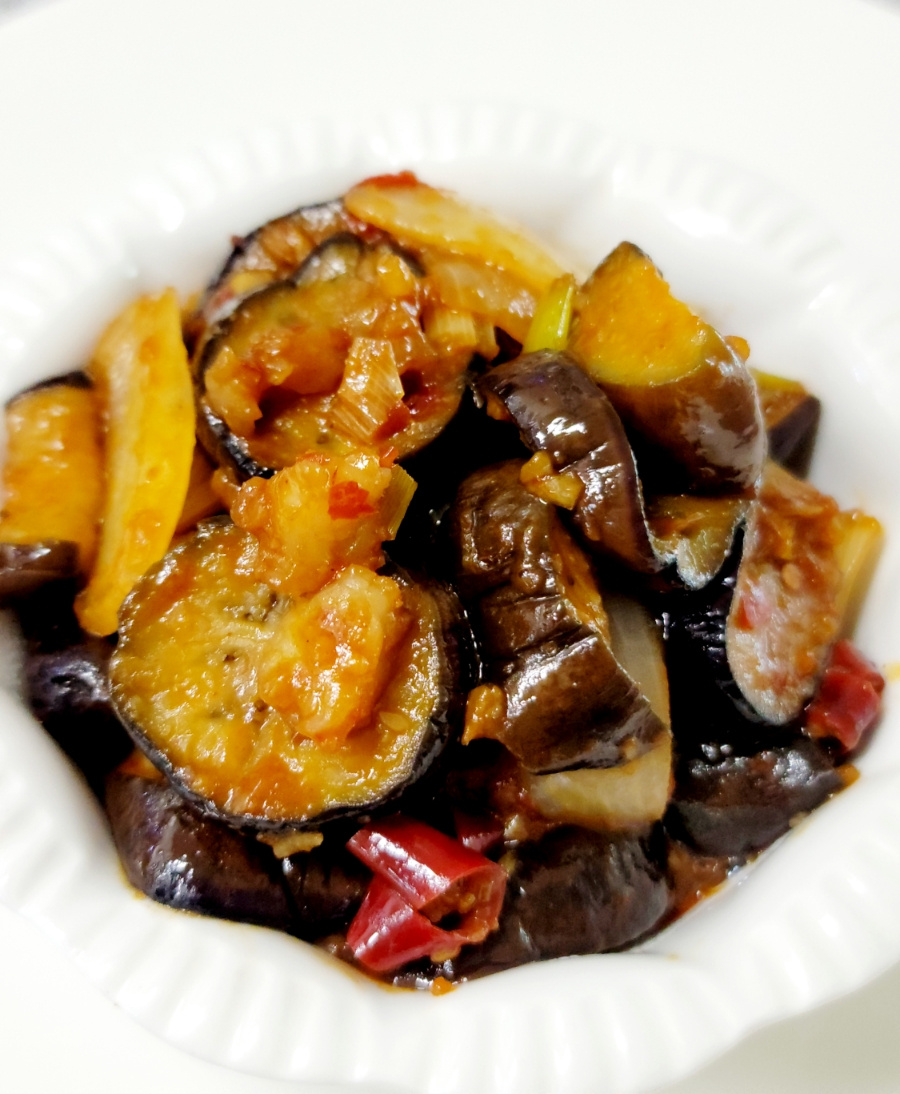Flavor Explosion! Doubanjiang Eggplant and Shrimp Stir-fry Recipe
The Best Home-Cooked Side Dish! A Golden Recipe for Sweet and Savory Doubanjiang Eggplant Stir-fry

That eggplant sitting in your fridge for a while? We can’t delay any longer! With me today, even eggplant on the verge of spoiling will be transformed into a fantastic dish in no time. Utilizing the rich doubanjiang sauce that captivates Korean palates, create a flavorful eggplant and shrimp stir-fry with a wonderful texture, easily and quickly. It’s a perfect dish for a side with rice or as a snack with drinks!
Main Ingredients- 3 Eggplants
- Frozen Shrimp (Optional)
- 1 Dried Red Chili Pepper
- 1/2 Stalk Green Onion
- 1 tsp Minced Garlic
- Vegetable Oil, as needed
Starch Slurry- 1 Tbsp Potato Starch or Cornstarch
- 2 Tbsp Water
Savory & Spicy Sauce- 3 Tbsp Doubanjiang (Fermented Bean Paste)
- 1 Tbsp Oyster Sauce
- 1 Tbsp Mirin (Cooking Wine)
- 1 Tbsp Potato Starch or Cornstarch
- 2 Tbsp Water
Savory & Spicy Sauce- 3 Tbsp Doubanjiang (Fermented Bean Paste)
- 1 Tbsp Oyster Sauce
- 1 Tbsp Mirin (Cooking Wine)
Cooking Instructions
Step 1
Prepare 3 fresh eggplants. Wash them thoroughly and pat dry.

Step 2
Prepare frozen shrimp. Adding a generous amount of shrimp enhances the flavor profile. (This is also a great recipe for ‘cleaning out the fridge,’ using up leftover vegetables or seafood.)

Step 3
Remove the ends of the eggplant. Slice them diagonally into about 1cm (1/2 inch) thick pieces. If the eggplant is particularly thick, you can cut it in half lengthwise and then slice into half-moon shapes. This way of cutting allows the sauce to penetrate better, making it more delicious.

Step 4
Roughly chop the onion. It will add sweetness and depth when stir-fried with the eggplant.

Step 5
If the shrimp are large, chop them into small, bite-sized pieces (about 1-2cm). You can also use them whole to preserve their natural flavor, but chopping them to match the other ingredients is also a good method.

Step 6
Finely chop the green onion. It will add a fragrant aroma.

Step 7
Cut the dried red chili pepper into small pieces with scissors and remove the seeds. Removing the seeds helps prevent oil splattering when frying and controls the spiciness.

Step 8
In a bowl, combine 1 tablespoon of starch and 2 tablespoons of water, mixing well to create a starch slurry. This slurry will thicken the stir-fry at the end, helping the sauce cling to the ingredients.

Step 9
In another bowl, combine 3 tablespoons of doubanjiang, 1 tablespoon of oyster sauce, and 1 tablespoon of mirin (cooking wine). Mix well to create the sauce in advance. Preparing the sauce beforehand allows for quick cooking without feeling rushed.

Step 10
Heat a generous amount of vegetable oil in a pan over medium-low heat. Add the chopped green onion, dried chili pepper, and minced garlic. Stir-fry until fragrant, being careful not to burn them, to infuse the oil with flavor. The aroma from the green onion and garlic oil adds depth to the dish.

Step 11
Once the oil is sufficiently hot, add the sliced eggplant and onion. Stir-fry over medium heat until the eggplant becomes tender and slightly translucent.

Step 12
When the eggplant has softened slightly, add the prepared shrimp and stir-fry together. Shrimp cook quickly, so avoid overcooking.

Step 13
Pour in the pre-made sauce and stir-fry quickly to coat all ingredients evenly. Cooking over high heat helps to concentrate the flavors without losing moisture.

Step 14
Finally, gradually add the starch slurry while stirring rapidly. Once the sauce thickens and becomes glossy, turn off the heat. (Sesame oil was omitted as the green onion, garlic, and chili provided ample fragrance. You can add a drizzle at the end if you prefer.)

Step 15
Your wonderful Doubanjiang Eggplant and Shrimp Stir-fry is complete! Serve it beautifully on a plate. (It’s a bit disappointing there weren’t more shrimp, but next time I’ll add plenty for an even richer dish. Even with fewer shrimp, the taste is definitely noticeable!)

Step 16
Eggplant is rich in anthocyanins, which can help support eye and cardiovascular health. Its antioxidant properties are also known to aid in anti-aging and cancer prevention. Furthermore, it is believed to help lower cholesterol levels, contributing to the prevention of high blood pressure.



